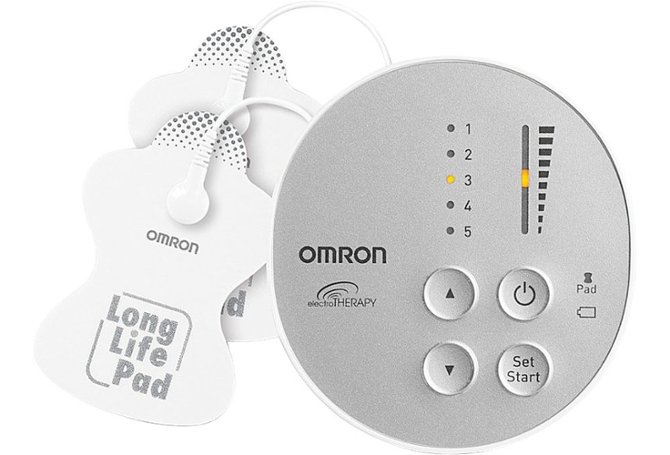The Benefits of Using a TENS Unit to Relieve Pain

carousel
TENS (transcutaneous electrical nerve stimulation) therapy is a form of electrotherapy used for treating both chronic and acute pain. Until recently, this method of pain management was only administered at a physician’s or chiropractor’s office.
If you’re new to learning about TENS, you might also be confused about the difference between a TENS unit and an EMS machine. Unlike TENS, EMS (electronic muscle stimulation) makes your muscles contract and is often used for building or toning muscle. TENS, on the other hand, stimulates your nerve cells, which is how it helps to relieve pain. On that note, there are several benefits to using a TENS machine to relieve pain.
A TENS unit provides drug-free pain relief.
TENS units are pain management devices that stimulate the body's natural pain-relieving mechanisms by interrupting the nerve’s pain signal to the affected area. Using a TENS machine may also stimulate the release of endorphins, the body’s natural painkillers. This can be especially beneficial for people with chronic pain from conditions like arthritis, migraines, and back pain, but they can also help relieve intermittent bouts of menstrual pain.
Unlike some prescription painkillers, TENS units are not habit-forming and don’t pose serious side effects. Plus, the threat of interacting with other medications isn’t an issue with TENS. Overall, TENS units give you a more natural approach to pain management.See Disclosure 1 Whether you use them in place of pharmaceuticals or to augment the effects of other painkillers, you have more control over your treatment.
Studies have shown positive results for various conditions.
Since TENS units do not require a prescription to use, they aren’t subjected to the same regulations as pharmaceuticals. However, many labs and clinics have collected data and performed studies on the effectiveness of TENS units on treating patients with several pain conditions.
Studies suggest that TENS units can help with inflammation and postoperative pain, which occurs after knee and other joint surgeries where movement is necessary for recovery by very painful at first.2 Furthermore, when researching treating nerve pain with TENS machines, the findings are positive but note that better placebos and larger samples will trend towards more definitive results. Additionally, TENS therapy is helpful for fibromyalgia, bursitis, and peripheral artery disease.See Disclosure 3
Although, even without a diagnosed condition, TENS units can aid in healing from minor aches and pains. Many people use TENS devices as part of their workout recovery routine. If you overdo it at the gym, sometimes a percussive massager is adequate to relieve muscle pain. While other times, a stronger TENS treatment is needed to loosen tense knots.
Side effects are minimal and uncommon.
With TENS therapy, there is little risk of adverse side effects to your overall health and wellness. While there are some reports of skin irritation from wearing the pads, this can be prevented by using hypo-allergenic pads.
There are certain conditions and circumstances that make TENS use limited or discouraged. For example, you should not use a TENS unit:
- On your abdomen if you are pregnant
- On or near your chest if you have heart disease or a cardioverter/defibrillator, neurostimulator, or indwelling blood pressure monitor
- On the head, neck, or shoulders if you have epilepsy
- On damaged tissue
- On or near the eyes, front of the neck, mouth, or genitals
TENS units are cost-effective for long-term use.
References.
1. Vance, Carol GT., Dana L. Dailey, Barbara A. Rakel and Kathleen A. Sluka.” Using TENS for Pain Control: The State of the Evidence.” Pain Management. May 4, 2014. https://www.ncbi.nlm.nih.gov/pmc/articles/PMC4186747/.
2. Parseliunas, Audrius, Saulius Paskauskas, Egle Kubiliute, Jovydas Vaitekunas and Donatas Venskutonis. “Transcutaneous Electric Nerve Stimulation Reduces Acute Postoperative Pain and Analgesic Use After Open Inguinal Hernia Surgery: A Randomized, Double-Blind, Placebo-Controlled Trial.” The Journal of Pain, US Association for the Study of Pain. December 10, 2020. https://www.jpain.org/article/S1526-5900(20)30108-5/fulltext.
3. Jamison, Robert, Robert R. Edwards, Samantha Curran, Limeng Wan, Edgar L. Ross, Christopher J. Gilligan, Shai N. Gozani. “Effects of Wearable Transcutaneous Electrical Nerve Stimulation on Fibromyalgia: A Randomized Controlled Trial.” Journal of Pain Research, American Society of Pain and Neuroscience. July 13, 2021. https://www.dovepress.com/effects-of-wearable-transcutaneous-electrical-nerve-stimulation-on-fib-peer-reviewed-fulltext-article-JPR.
Additional information:
These statements and any information contained herein are intended for educational purposes only and are not meant to substitute for medical care or to prescribe treatment for any specific health condition. Carefully review product labels for instructions and important safety information and consider consulting with a health care professional regarding your use of health and wellness products.